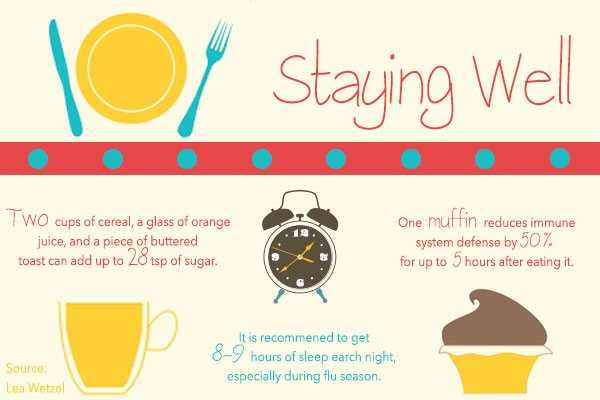
As the weather starts to change, it is important to keep the immune system at its best to avoid cold and flu viruses.
According to Lea Wetzell, a licensed nutritionist from Nutritional Weight and Wellness, it’s easy to prevent cold and flu viruses with a simple change in diet.
“Every year it seems like there is a new flu epidemic, and honestly the only long term prevention plan is nutrition and keeping your body healthy,” Wetzell said.
Wetzell explained that sleep and washing hands are key things that college students can do to stay healthy. But according to Nutritional Weight and Wellness, staying away from foods with a high sugar content can help promote a healthy body as well because that tends to reduce the body’s defense against cold and flu viruses up to 50 percent for around five hours after consumption.
Nutritional Weight and Wellness is a company that approaches health issues through research to show that a healthy lifestyle and immune system can be achieved by a change in diet.
Wetzell said that a common breakfast including two cups of cereal, one glass of orange juice and one piece of toast with butter puts 28 teaspoons of sugar into the body. She suggests instead, an immune-building breakfast including eggs, half a cup of fruit and nitrate-free bacon.
Wetzell suggests that students do their best to stay away from processed or man-made foods.
“As much as you can within your options, try to be choosing the real options, avoiding the pizza, avoiding the fried foods and trying to go for the fruits and vegetables,” Wetzell said. “Healthy meats and fats.”
Protein smoothies and vitamin supplements are easy ways that college students can get necessary nutrients in their diet to help their immune systems.
St. Thomas junior Natalie Zielke explained that nutrition started playing a big part in her life this past summer.
“I just realized that I feel so much better when I eat healthier and workout regularly,” Zielke said.
Wetzell said trans-fats are another thing that can also harm the body by making the cell membrane almost like plastic, preventing nutrients from getting in and waste from getting out. Fats that support the immune system are contained in foods such as walnuts, avocados and olives.
Aside from eating right, another key factor of building the immune system and preventing flu and cold viruses is sleep.
“As much as you can, just try and prepare yourself in advance so you’re not cramming and staying up super late every night of the week,” Wetzell said. “Set yourself a regular schedule of sleep.”
An average adult is supposed to get eight to nine hours of sleep a night; however, most only get about six.
Moderate physical activity can also help keep cold and flu viruses away, and Wetzell said that walking just thirty minutes a day can strengthen immune function.
Supplements of Vitamin C, Vitamin D and zinc are easy and inexpensive ways to add important nutrients to your diet too, according to Wetzell.
Rachel Weiss can be reached at weis3565@stthomas.edu.


